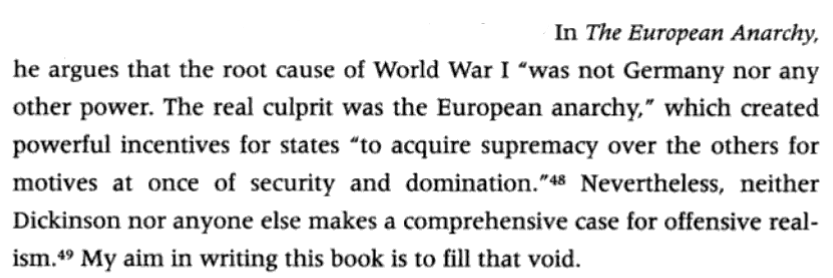
G. Lowes Dickinson is the first "modern" international relations theorist. You probably haven't heard of him.
But he's also why "Offensive Realism" -- you *might* have heard of it -- is the original "modern" international relations theory.
Time to #KeepRealismReal!
[THREAD]
But he's also why "Offensive Realism" -- you *might* have heard of it -- is the original "modern" international relations theory.
Time to #KeepRealismReal!
[THREAD]

As I've discussed in previous threads, the modern discipline of International Relations is a product of World War I
See here...
See here...
https://twitter.com/ProfPaulPoast/status/1391016643539648515
In 1916, Dickinson wrote "The European Anarchy"
google.com/books/edition/…
google.com/books/edition/…
Dickinson's book might be the most important, and yet most under-read, book in international relations.
Why is that?
Why is that?
Much more widely read (and cited) is a book published a few years before the war (1911), Norman Angell's "The Great Illusion" (where the original version, Europe's Optical Illusion, was published in 1909)
google.com/books/edition/…
google.com/books/edition/…
Some have labelled "The Great Illusion" the "founding text" of modern international relations scholarship, a claim Martin Ceadel unpacks in this @RISjnl piece
cambridge.org/core/journals/…
cambridge.org/core/journals/…
But I agree with @JeanneMorefiel1's assessment of Dickinson's book.
taylorfrancis.com/chapters/edit/…
taylorfrancis.com/chapters/edit/…
@JeanneMorefiel1 writes
"If we understand a classic to be a work of enduring interest and relevance for our times, few texts in the history of contemporary IR match The European Anarchy."
"If we understand a classic to be a work of enduring interest and relevance for our times, few texts in the history of contemporary IR match The European Anarchy."
The primary reason for Dickinson being viewed as a classic, if he's read at all, is his use of the term "anarchy".
As Donnelly showed in this @InternatlTheory
piece, Dickinson's book really does stand out in it's usage of the word.
cambridge.org/core/journals/…
As Donnelly showed in this @InternatlTheory
piece, Dickinson's book really does stand out in it's usage of the word.
cambridge.org/core/journals/…
What's important from the standpoint of IR theory (meaning an abstract explanation for why war and cooperation happen...or not) is Dickinson's claims about the implication of anarchy.
Keep in mind that his main goal in writing the book was to understand why the ongoing "Great War" had started. 



By "anarchy" he means "no common law" or "no common force". Under such a condition, "mutual fear" and "mutual suspicion" will be endemic 

So a state, in order to be secure in the absence of a common authority (i.e. world government), needs to dominate other states.
States don't inherently want to dominate. But they don't want to be dominated. The end result is a tragedy.
States don't inherently want to dominate. But they don't want to be dominated. The end result is a tragedy.
Note that concerns over the absence of a world government (and consideration of the conditions to bring one about) would be of continuing (even primary) interest to Realist scholars
https://twitter.com/ProfPaulPoast/status/1393901491413524482
Dickinson's argument for the war's cause stood out among many popular ones, such as James Beck's book (which came out of a widely read @nytimes magazine article) which placed the blame squarely on Germany
google.com/books/edition/…
google.com/books/edition/…
Why would Dickinson want to blame the entire SYSTEM, not just any single STATE? Well, he was a early advocate for the League of Nations as a means of reforming Europe.
Indeed, he coined the phrase (see the series of articles he wrote for @TheAtlantic)
theatlantic.com/author/g-lowes…
Indeed, he coined the phrase (see the series of articles he wrote for @TheAtlantic)
theatlantic.com/author/g-lowes…
Critical to Dickinson's theory for the war is not
Anarchy -> fear -> arms -> makes war possible
But that
Anarchy -> fear -> states aggressively attack
Anarchy -> fear -> arms -> makes war possible
But that
Anarchy -> fear -> states aggressively attack
This idea -- that anarchy drives states to seek to dominate others -- gained more prominence in 1950 when John Herz published the following paper in @World_Pol
cambridge.org/core/journals/…
cambridge.org/core/journals/…
The paper introduced the phrase "security dilemma" to the IR discipline, though, as I've stressed in other #KeepRealismReal threads, the *idea* of the security dilemma was already around 👇
https://twitter.com/ProfPaulPoast/status/1391016679036030976
Herz wrote that anarchy leads states (or any actor) to fear for its security. This, in turn, leads states to seek power over one another 

At this point, we should be asking some questions:
Does anarchy REALLY lead states to be aggressive?
Does "seeking power" truly mean "dominating others"?
Does anarchy REALLY lead states to be aggressive?
Does "seeking power" truly mean "dominating others"?
Those questions would motivate IR theorists -- particularly those in the Realist tradition -- for the next few decades.
In 1991, Jack Snyder summed up the state of literature in his Myths of Empire
amazon.com/Myths-Empire-D…
In 1991, Jack Snyder summed up the state of literature in his Myths of Empire
amazon.com/Myths-Empire-D…
Snyder was clearly laid out the two ways Realist scholars had thought about the consequence of anarchy: 

So both "aggressive realists" and "defensive realists" say security is the primary motivation of states, but have opposite views on how states achieve it.
For Snyder, @stephenWalt's "Origins of Alliances" is the key work of "Defensive Realism"
amazon.com/Origins-Allian…
amazon.com/Origins-Allian…
As for "Aggressive Realism", it's John Mearsheimer's "Back to the Future" @Journal_IS piece, which I discussed in this thread
https://twitter.com/ProfPaulPoast/status/1412739908565884928
Notice that Snyder views Waltz as a bit of both. I agree with that view, which I elaborated upon in this thread
https://twitter.com/ProfPaulPoast/status/1401139406996639744
As for Mearsheimer, he would go on to fleshout his ideas for "aggressive realism" (or what he would now call "offensive realism") a decade later in "The Tragedy of Great Power Politics"
amazon.com/Tragedy-Great-…
amazon.com/Tragedy-Great-…
How does "offensive realism" stack up against "defensive realism"? That's for another thread.
In sum, it is clear that "hegemonic/aggressive/offensive" realism has a long lineage, tracing back to Dickinson and his "founding text" of modern international relations theory.
[END]
[END]
• • •
Missing some Tweet in this thread? You can try to
force a refresh











